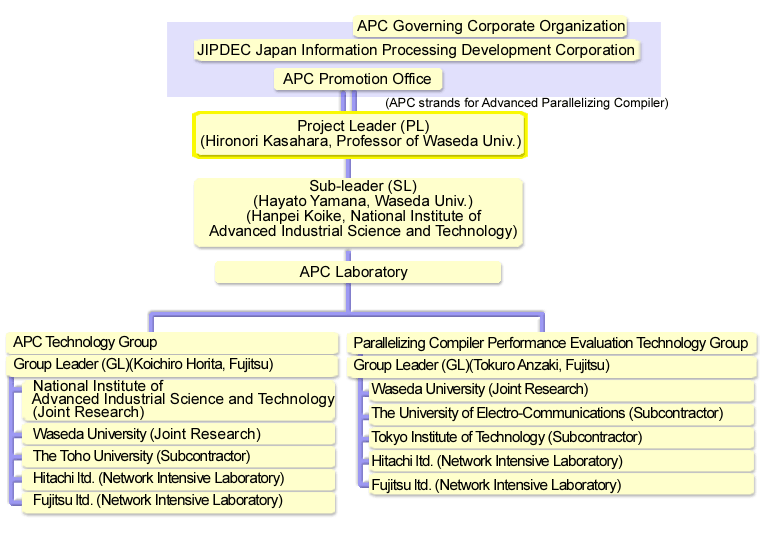Schematic Diagram of Implementation Framework


Development Promotion Committee: ( twice a year )
The highest decision making committee discussing approaches to R&D based on APC basic plan.
Held twice, in the weeks of Oct.13,2000 and Apr.23 in FY 2001.Members: PL, SL, representatives of each participating organization (except subcontractors)
Technology Committee: ( once a month )
Discussing project targets, research plans, approaches of the research association, year-end reports.
Held four times, on Dec.,2000, Jan.,Feb.,and Apr.,in FY 2001..Members: PL, SL, GL, personnel from each company, cooperating research facility and subcontractor who are related to the issue discussed
Intellectual Property Rights Committee ( at request )
Discussing internal rules on intellectual property rights and their application.
Held once in FY 2001Members: PL, SL, GL, JIPDEC administrators, persons appointed by the inventors
Administrative Liaison Committee ( at request )
Discussing budget, external assignment, contracting of clerical and administrative work, interim inspections.
Held twice in FY 2001.Members: Administrators of each related organization (except joint-research participants and subcontractors), and PL and SL as necessary
Technology Forum ( every other week )
Discussing detailed research plans, research progress, technology itself and overseas researches.
Held 10 times in FY 2001.Members: All members of each related organization (the meeting is attended by the researchers related to the technology issues discussed at each meeting).
International Cooperation Committee with Advisory Board ( every year )
Having advices and evaluation for the APC activities from the world leading professors to achieve internationally valuable R&D results.
International Advisory Board
Professor Monica S. Lam Professor Rudolf Eigenmann Professor Francois Irigoin
Definition and Rules of Operation of Network Intensive Laboratory

(Excerpt from the operating rules of the APC research body)
- Definition: The Network Intensive Laboratory is a laboratory where managers responsible for R&D provide guidance under a centralized environment with regard to R&D and its results, such as programs, specifications and other information. Because the focus of this R&D is software, centralized management is feasible even if the participants are widely separated geographically.
Rules of Operation
- Modules (constituent elements of programs) modified or newly developed in this project and sets thereof will be published so that all project members can use them in common.
- Modules produced outside this project may also be used in common, provided that such use is necessary for the advancement of the project.
- (3) The researchers taking part in this project access the project through computer terminals registered under the management of laboratories listed as part of the Network Intensive Laboratory.
- Researchers who are members of the Network Intensive Laboratory continually exchange technological information and conduct development work over a network, and regularly (in intervals of a few weeks) report the status of their research work directly to the PL. Researchers also meet regularly to exchange technological information and conduct development work with respect to each R&D item.
- If an emergency conference of researchers is needed, researchers can access a network conference without delay, just as they conduct research over distances in a centrally managed fashion. If a conference is called by the PL, however, participants must immediately convene in the location stipulated by the PL.
- A framework is adopted to enable rapid mutual distribution of the results of R&D to all participating researchers.
Supplementary Items to the APC Project
- " Usable format" in Rules of Operation (1) refers to the execute form used in this project.
- The " mutual publication among researchers" in Rules of Operation (1) refers to publication within the research body over a network.
- " Modules produced outside this project may also be used in common, provided that such use is necessary for the advancement of the project" in Rules of Operation (2) indicates that modules produced within the program (" A" ) require the use of modules produced outside the program (" B" ), B is used as the execute form. To protect the intellectual property rights covering those " modules produced outside this project," B may only be used among the researchers in this project to operate A, with the consent of the owner of B.
- The " computer terminals registered" in Rules of Operation (3) refer to computers purchased, leased or rented in the budget of this project.
- " Access" in Rules of Operation (3) refers to the ability to the support of an environment in which researchers can connect to and log into resources according to their security levels, or can load jobs in batch format from a remote location. To maintain an appropriate security level, access is granted only to registered computers that are used to send usage requests from researchers in the project.